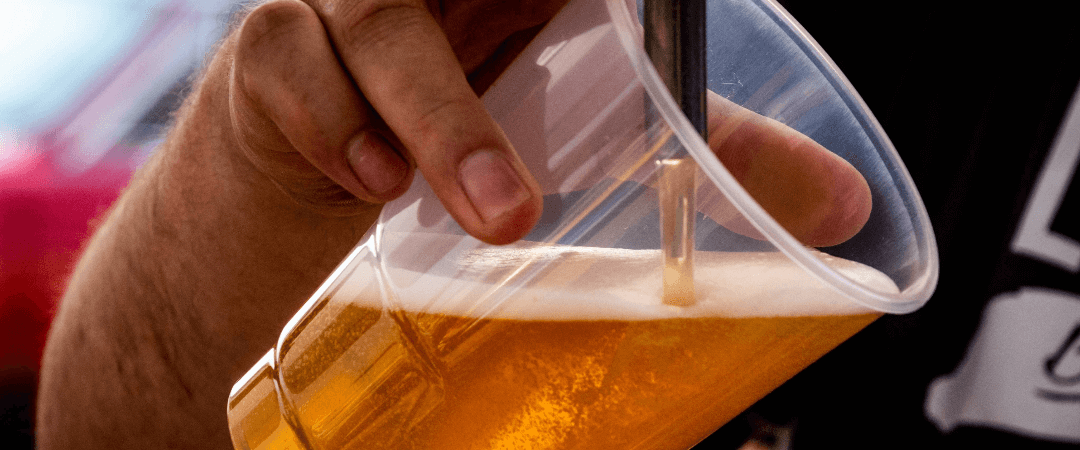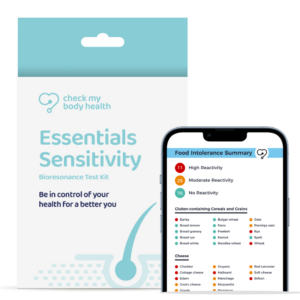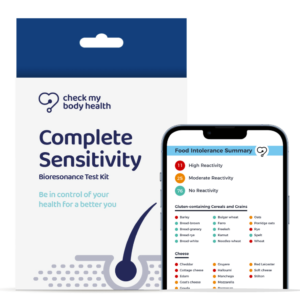
Medically reviewed by Sian Baker, Dip ION mBANT mCNHC
on February 15, 2021. To give you technically accurate, evidence-based information, content published on the Check My Body Health blog is reviewed by credentialed professionals with expertise in medical and bioscience fields.
If you feel unwell or experience unpleasant or uncomfortable symptoms after drinking alcohol, it can be easy to dismiss them as simply the normal effects that come after having a drink. However, instead of this, you may have alcohol intolerance. So, if you experience the same discomfort, skin flushes or bloating whenever you have a glass of wine or pint of beer, there’s every chance you have an intolerance to alcohol.
In this post, we’ll take a look at what it means to have an alcohol intolerance and allergy, including the symptoms and how common intolerances are. We’ll also cover how you can test to check whether or not you have an intolerance here at Check My Body Health, because we’re here to help you take back control of your health.
What is alcohol intolerance?
Alcohol intolerance is when your body can’t break down the toxins in alcohol because it lacks the right enzymes. As a result, you experience a series of symptoms that range from mild to moderate.
Can you have an alcohol allergy?
Yes, you can experience an alcohol allergy, however, they are exceptionally rare. If you experience allergy symptoms after drinking alcohol, even just one specific type of drink, you’re far more likely to have an allergy or intolerance to one of the ingredients or chemicals in the drink, such as:
It’s also possible that, rather than you having an allergy, the alcohol worsens a pre-existing condition, such as asthma or rhinitis.
What are the symptoms of alcohol intolerance?
You may experience a range of symptoms if you suffer from an alcohol intolerance, which is often associated with the general effects of drinking a large amount of alcohol, such as flushing of the face, diarrhoea and nausea. However, if you have an intolerance, you’re likely to experience symptoms after drinking even a very small amount. Alcohol intolerance symptoms include:
- Flushing
- Red and/or itchy skin
- Blocked nose
- Runny nose
- Nausea
- Vomiting
- Diarrhoea
- Low blood pressure
How common is alcohol intolerance?
In Asia, it’s relatively common for adults to have an intolerance to alcohol, with between 5% and 10% experiencing symptoms after having a drink. As much as 85% of people in East Asian countries experience symptoms after drinking alcohol. In Western countries, it isn’t quite as common; an American study found that 7% of adults have an alcohol intolerance, with 9% of women experiencing symptoms compared to 5% of men.
How do you test for alcohol intolerance?
If you experience the symptoms of an intolerance after drinking alcohol, you may want to find out for sure so you can manage it properly. Ways to confirm whether you have an intolerance include:
- An elimination diet, which means removing alcohol from your diet to monitor whether the symptoms stop.
- A food diary, where you log everything you eat and drink to see if it syncs with when you experience symptoms.
- Speaking to your doctor to discuss your symptoms.
Taking a food intolerance test at home to quickly and accurately find out if you have an alcohol intolerance.
What should you do if you think you have alcohol intolerance?
If you believe you have an intolerance to alcohol, it’s recommended that you stop drinking alcoholic drinks until you’re able to have it confirmed. Symptoms of alcohol intolerance are generally mild, but can be unpleasant and uncomfortable, so are worth avoiding if possible.
To discover whether you have an alcohol intolerance in just one week, a complete sensitivity test can confirm it either way.
Why do you have a sudden alcohol intolerance?
You can develop a sudden intolerance to alcohol if your body no longer produces enough of the enzymes it needs to break down the toxins. This can happen at any stage of your life, even if you’ve drunk alcohol for years and never experienced symptoms before. At first, it may be easy to assume you’re feeling the standard effects of alcohol, but if you persistently have symptoms after having a drink you may find that you’ve developed an intolerance.
Alcohol alternatives
If you enjoy the taste of alcoholic drinks, there are alternatives to try if you have developed an intolerance. They won’t give you the same effects as alcohol, but you should still enjoy the flavour:
- Non-alcoholic beer
- Non-alcoholic cider
- Non-alcoholic spirits and mixers
- Ginger beer
- Virgin cocktails/Mocktails
- Kombucha
Test to see if you have an alcohol intolerance
If you think you might have developed an alcohol intolerance, it’s important to find out for sure so you’re in a better position to manage your health. A complete sensitivity test is a fast and reliable way to find out in just one week.
References
1. Vitamin D. NIH, Office of Dietary Supplements. URL. Accessed February 15, 2021.
2. Nair R, Maseeh A. Vitamin D: The “sunshine” vitamin. J Pharmacol Pharmacother. 2012;3(2):118-126.
3. Vitamin D2 vs. D3: Which Should I Take for Bone Health?. Cleveland Clinic. URL. Accessed February 15, 2021.
4. Jetty V, Glueck CJ, Wang P, et al. Safety of 50,000-100,000 Units of Vitamin D3/Week in Vitamin D-Deficient, Hypercholesterolemic Patients with Reversible Statin Intolerance. N Am J Med Sci. 2016;8(3):156-162.
5. On call: Vitamin D2 or D3? Harvard Medical School. URL. Accessed February 15, 2021




